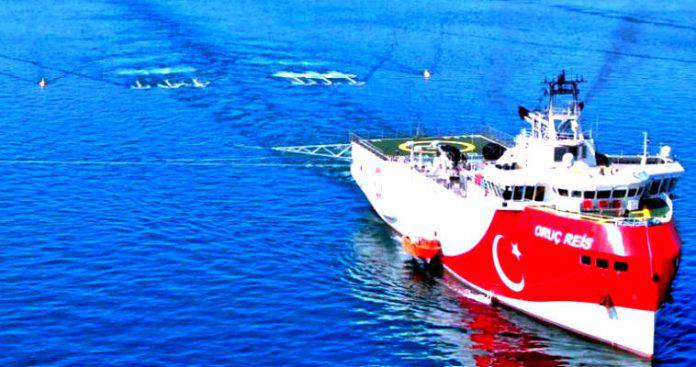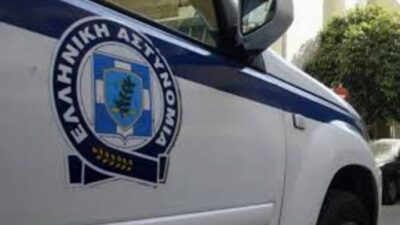Zacharias Michas: Why Erdogan is sending the Oruc Reis back to Kastellorizo
12/10/2020
The sudden escalation on the part of Turkey with the new exit of the research vessel Oruc Reis, at a time when everyone was waiting for the start of the exploratory talks, comes at an extremely sensitive juncture. The attempt to determine developments by Ankara through the method of military coercion is extremely dangerous.
The conditions in this period, in combination with decisions taken for the defense reinforcement of Greece, make the next period crucial. Erdogan’s obsession with military coercion carries the risk of provoking war.
Turkish activities can also have a positive impact on Greek interests, as it buries, or at least makes difficult, the prospect of launching exploratory contacts and certainly pushes the EU towards imposing sanctions on Turkey. It proves once again that Ankara understands the process of resolving problems with its neighbors.
Turkey is not interested in a fair solution unless it is declared an interpreter of the term “law”, that is if it does not tailor any agreement to its own measures. So, those in Athens must finally get rid of illusions. In essence, whatever process is chosen for talks, it is confirmed once again that in the end, it will degenerate into a game of who will be blamed for the collapse of the process (blame game).
Return to military coercion
The Turkish action to re-launch the Oruc Reis and issue NAVTEX for a sea area that reaches the borders of Greek territorial waters (6.5 miles from Kastellorizo) did not surprise the Greek military leadership. “The move was expected. There are ships of the Turkish fleet in the area, but not in the way they were deployed during the previous voyage of the research ship. At least until this point. We are not worried, we are vigilant. They do not scare us.” This was the response of the Ministry of National Defense circles.
They added that they do not even enter into the process of interpreting Turkish behavior, as the situation is now self-evident: “Erdogan has set fire to the wider geopolitical region. It was not even limited to the Mediterranean. His “grace” has reached the Caucasus and who knows what else he will do. We are ready.” In communications terms their position is understandable.
However, it is difficult to believe that there is no broader assessment of the motives and objectives of the Erdogan regime. Simply, the assessment is for use by the military and civilian leadership. The main factors that determine the designs of Ankara and offer an interpretation of the new escalation are:
- First, the final stretch to the US election.
- Secondly, the very difficult situation of the Turkish economy.
- Third, the decision for rapid reinforcement of the Greek Armed Forces and primarily the Air Force.
The American elections
It is common knowledge that the American elections and the division that prevails in the political scene there, but also among a large part of American society, have every reason to worry Greece. This gives Turkey the impression that there may be a “window of opportunity” for an effort to exact from Greece in a dynamic way things it can not exact in a negotiation, due to their maximalist and obviously illegal nature.
Every electoral process leads countries to introspection. In the case of the USA, this is estimated to reduce the mood for active involvement in a theater of instability, such as the Greek-Turkish front. As a result, the deterrents to the Erdogan regime are reduced. Obviously, then, he is trying to seize the opportunity.
On the other hand, Turkey’s violation of any allied measure has even pushed the scandalous tolerance of the West to its limits. In other words, it is doubtful whether the US and the EU are willing to tolerate a Turkish military operation against Greece. Of course, in these times nothing can be ruled out. Things will be observed as they play out …
The crisis in the Turkish economy
Despite its remarkable resilience, due to a network of supporting factors – not always measurable by conventional criteria – the Turkish economy still has one foot in the abyss. The continuous landslide of the Turkish lira is an unmistakable sign.
The economic climate in Turkey is deteriorating and it is reasonable to assume that this trend will not be reversed, at least as long as Erdogan makes decisions that are against the interests of Western countries, such as the supply and now about the activation of the Russian S- 400. The economic crisis is putting pressure on the Erdogan regime at home, while threatening the ability of the Turkish armed forces to cope with long-term involvement on the many fronts that have been opened.
Possibly, the economic crisis has cultivated a sense of urgency in the regime. This, combined with the EU’s reluctance to impose sanctions and US introversion, could push Erdogan to escalate military provocations. The goal is permanent: Any negotiation with Greece to proceed under the “damoclean sword” of the threat of war, or under the weight of a done deal.
The rearmament of the Greek Armed Forces
As this author has said in the past, one positive effect of the military coercion against Greece is its awakening. Realizing that, despite their 15-year abandonment, the Greek Armed Forces showed an unexpectedly positive image in the recent tests they came under, the government moved to re-equip them, realizing that it was a necessary and urgent investment.
Despite Turkish reports that the 18 Rafale fighters, which the Hellenic Air Force is expected to acquire, are not enough, Ankara’s concern about a quality addition to the Greek arsenal cannot be hidden, as it will provide operational capabilities that did not exist before. It is possible, then, that the Turkish leadership is moving closer to the choice that escalation of military coercion must take place now, before the new fighters are acquired and become operational, in order to be politically effective.
In this sense, there is another proof of the often “irrational” nature of strategy. Instead of strengthening the Greek deterrent, the prospect of Rafale supply supplies creates a “window of vulnerability” for Greece, increasing the chances of military involvement. What is positive is the rapid (within a few months) process of the Rafale fighters joining the Greek air fleet, a fact that shortens the duration of the “window of opportunity” for Turkey. This increases the pressure on the Erdogan regime, increasing its chances of making hasty moves. So, in the short term, it leads to instability.





